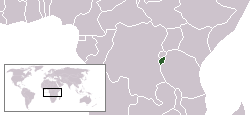Former rebel becomes President of Burundi
Friday, August 19, 2005

Pierre Nkurunziza, leader of the former rebel group CNDD-FDD, has been elected unopposed as President of Burundi by the country's Senate and National Assembly. The CNDD-FDD had won landslide victories in communal and national elections earlier this year, the first since the 1993 assassination of President Melchior Ndadaye plunged Burundi into more than a decade of ethnically-charged civil war. Nkurunziza replaces Domitien Ndayizeye, who had served as head of a transitional government since 2003.
One key challenge will be to resolve ongoing tension between the country's Hutu and Tutsi ethnic groups. More than 300,000 people, mostly civilians, have been killed since 1993. Burundi's Tutsi-dominated army is believed to have killed thousands of Hutu civilians during the ten-year civil war, while Nkurunziza's own group, CNDD-FDD, has been accused of deliberately killing Tutsis. The extremist group Palipehutu-FNL continues to stage attacks, with this week seeing the first anniversary of the Gatumba massacre, in which more than 150 Congolese Tutsi refugees were killed.
Related news
- "Activists_remember_Burundi%27s_Gatumba_massacre" — Wikinews, August 13, 2005
- "Six killed in Burundi church massacre" — Wikinews, June 18, 2005
- "Tanzania accused of supporting terrorism to destabilise Burundi" — Wikinews, July 6, 2005
- "Burundian Hutu extremists have killed 300 civilians in the last two months" — Wikinews, August 1, 2005
- "UN reports 'grim picture' of human rights in Burundi" — Wikinews, August 5, 2005
Sources
- "Burundi's born-again ex-rebel leader" — BBC News, August 18, 2005
- "Burundi MPs appoint new president" — BBC News, August 19, 2005
- "Nkurunziza: from near death to Burundi presidency" — BBC News, August 19, 2005
- "Burundi: No justice for victims of the Itaba massacre" — Amnesty International, February 24, 2003

